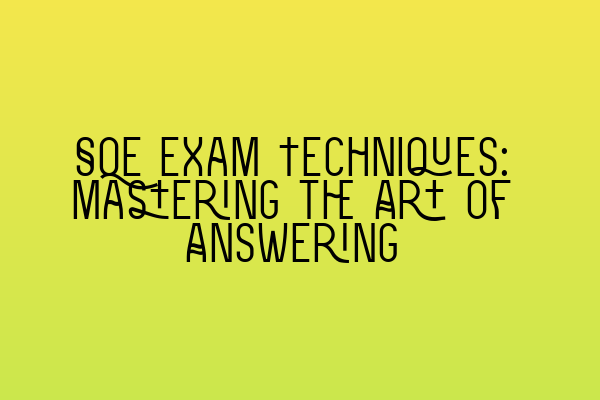SQE Exam Techniques: Mastering the Art of Answering
Preparing for the Solicitors Qualifying Examination (SQE) can be a daunting task. Aspiring solicitors are faced with the challenge of mastering a vast amount of legal knowledge and demonstrating their understanding through well-crafted answers. In this article, we will delve into the art of answering SQE exam questions and provide you with practical techniques to help you excel on exam day.
The Importance of Understanding the Question
One of the key factors in successfully answering SQE exam questions is closely examining and understanding what the question is asking. This may sound obvious, but it is surprisingly easy to misinterpret a question and provide an irrelevant answer. Take the time to carefully read and analyze the question, identifying the specific legal issues it encompasses.
For example, if you are presented with a question on land law, you may need to identify and address certain key topics, such as land charges or landlord responsibilities. These are essential areas of knowledge that you should familiarize yourself with to ensure you are fully equipped to answer related questions.
To further enhance your understanding of key topics in land law, we recommend reading the article “Key Topics in SQE Land Law: A Roadmap to Exam Success“. This resource provides valuable insights and guidance on how to navigate and succeed in this subject area.
Structuring Your Answers
Structure is crucial when answering SQE exam questions. By organizing your responses in a logical manner, you not only demonstrate your understanding of the subject matter but also make it easier for the examiner to follow your thought process.
A clear approach to structuring your answers is to use the IRAC (Issue, Rule, Application, Conclusion) method. This method involves:
- Issue: Clearly identifying and defining the legal issue(s) raised by the question.
- Rule: Explaining the relevant legal principles or rules that apply to the identified issue(s).
- Application: Applying the rules to the facts presented in the question, analyzing how they interact and provide a solution to the problem.
- Conclusion: Summarizing your analysis and providing a concise conclusion to the question.
By following this structured approach, you are not only making your answer more coherent but also showing the examiner that you have a sound understanding of the legal framework and can apply it effectively.
Utilizing Relevant Examples and Case Law
When answering SQE exam questions, incorporating relevant examples and case law can strengthen your argument and demonstrate a deeper understanding of the subject matter. Examples allow you to apply your theoretical knowledge to real-world scenarios, showcasing your ability to analyze and solve practical legal problems.
Additionally, referencing key cases that are relevant to the topic being discussed can further enhance the quality of your answer. Demonstrating an awareness of significant precedents and their implications indicates a higher level of knowledge and critical thinking.
For instance, if you are answering a question on landlord responsibilities, you could refer to the article “Understanding Landlord Responsibilities in the UK: Legal Obligations Explained“. This resource provides you with valuable insights on the legal obligations of landlords and can help you strengthen your answer through relevant examples and case analysis.
Practice with Mock Tests
Practice makes perfect, and this applies to SQE exam preparation as well. Engaging in regular practice with mock tests can significantly enhance your answering skills and exam performance. These tests provide you with an opportunity to apply the techniques discussed in this article, identify areas for improvement, and build your confidence in tackling different question types.
For interactive SQE mock tests specifically designed for property practice, we recommend checking out “Interactive SQE Mock Tests for Property: Sharpen Your Skills for Exam Success“. These valuable resources offer realistic exam simulations and comprehensive feedback to help you fine-tune your answering techniques and achieve exam success.
Conclusion
Mastering the art of answering SQE exam questions requires a combination of in-depth knowledge, careful analysis, and effective communication. By understanding the question, structuring your answers, utilizing examples and case law, and practicing with mock tests, you can significantly enhance your exam performance and increase your chances of success.
For essential tips and resources specifically tailored to property practice, make sure to read “SQE Prep: Essential Tips and Resources for Success in Property Practice” and “Examining Land Charges: Implications and Considerations“. These articles provide valuable insights and guidance to help you excel in this subject area.

Leave a Reply